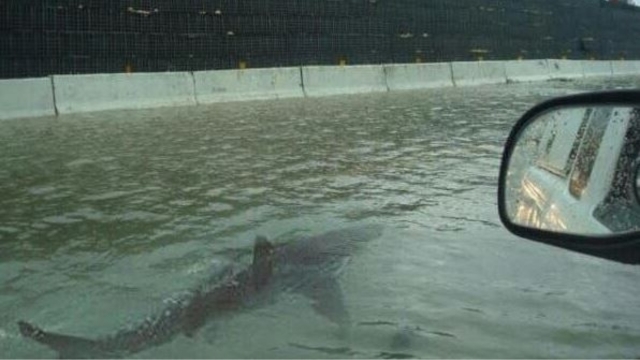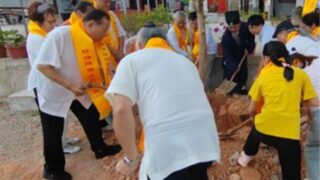When disasters hit, free media can save lives. Fake media and news can cause more casualties. The same is true for the disasters caused by religious persecution.
by Stefania Cerruti*
*A paper presented at the webinar “Mobilizing the Media for Tai Ji Men and Other FoRB cases,” co-organized by CESNUR and Human Rights Without Frontiers on May 8, 2023, after the World Press Freedom Day of May 4.


Did you ever see a shark swimming on a highway or a city avenue flooded with water? Perhaps you did—on social media and some tabloid newspapers. Pictures of these sharks appeared after Hurricane Harvey hit Texas and Louisiana in 2017. The same pictures went viral on social media when Hurricane Irma from the Caribbean extended to Florida, also in 2017, and Hurricane Florence flooded several highways in the Carolinas in 2018. They were not “similar” photos. They were the same. And they were all false pictures created with Photoshop.
My field of study and activity is disasters, both natural and human-made. How these disasters are reported is crucial and can either save lives or add to the casualties. When we are confronted with disasters, it is important that we affirm the freedom of the press. Our studies show that disasters often cause more victims in countries ruled by totalitarian regimes with no free media than where democracy prevails. This happens because totalitarian regimes’ first concern is to preserve their image. They do not want the media to show the suffering caused by disasters, which can convey an impression of weakness, or expose the ineffectiveness of their relief machine. However, since disaster relief in our globalized society can only be international—very few countries, if any, have all the skills, the technologies, and the resources to confront a major disaster alone—preventing the media from reporting the truth and minimizing what happened seriously and negatively impact the relief operations.
This is even worse with disasters such as epidemics, which travel from one country to others. Even without entering into the debate on the origins of COVID-19, certainly the absence of a free press in China delayed the international spread of reliable information about the virus that might have alerted other countries and saved innumerable lives.
On the other hand, together with a free press comes a fake press and fake news. The story of the sharks swimming on the highways and avenues was false but, originally, it was comparatively inoffensive. However, the shark story surfaced once again last year, in September 2022, when Hurricane Ian became the worst hurricane affecting Florida since 1935. This time, the shark fake news was told with a vicious twist, criticizing the U.S. authorities and the rescue agencies as so ineffective and corrupt that they would even let sharks swim free in cities and possibly kill citizens.
What was the difference with the previous shark fake stories? The simple answer is the war in Ukraine. The criticism of the United States about the alleged sharks swimming on flooded Florida streets and highways after Hurricane Ian was first aired by the Russian propaganda channel Sputnik and spread through the world by an army of Russian social media trolls. It even found its way to reputable media. But the videos and pictures were false. The real sharks were the Russian propaganda agents fabricating fake news and manipulating a real disaster.


Similar sharks also swim when a different kind of disasters happen, those caused by injustice and persecution against religious and other minorities. These are human-made disasters, but can be as dangerous as natural disasters, the more so because their catastrophic consequences can be measured in full only years after they happen, and some may be never known.
One such disaster was the raid against Tai Ji Men in Taiwan in 1996, with all its consequences. It is not exaggerated to call it a human-made disaster, since courts of law in Taiwan up to the Supreme Court clarified that it was based on false accusations and fabricated evidence. Clearly, the aim of those who instigated it was to create a disaster, a hurricane sweeping away Tai Ji Men, and a dirty water where the sharks of corruption and persecution could swim.
As in all disasters, particularly human-made, the assessment of all damages will take years. Apart from material and economic damages, slandered reputations, tears, and suffering are difficult to count. There may be damages caused to Tai Ji Men dizi (disciples) we will never know about.
The role of the media in the Tai Ji Men disaster was also decisive. Very few media reported honestly on the case, and only recently the activities of international scholars and human rights advocates led to some good reporting, although mostly on specialized media such as “Bitter Winter” or the “European Times.” We can only speculate whether reporting in Taiwan by a really independent press not afraid of criticizing the prosecutor and the government could have stopped or lead to the solution of the Tai Ji Men case right after it started.


What we know for sure is that fake news and irresponsible media, which accepted uncritically everything the prosecutor who started the case fed them, had a heavy responsibility in creating a climate of slander and discrimination against Tai Ji Men that became an important component of the disaster.
It is very difficult after a disaster hits to control fake news. The modern system of social media makes it virtually impossible, notwithstanding all claims by Twitter or Facebook that they have filters eliminating some fake news. Some studies claim that after disasters fake news gather six times more readers than genuine ones.
Again, this is also true for disasters created by religious persecution. Fake news accusing religious or spiritual movements of strange behavior—Tai Ji Men was even ridiculously accused of “raising goblins”—make for better copy and gather more readers than real news.
It looks like a lost cause, but the only way to contrast fake news is to have a free and responsible press committed to publish real and fact-checked stories. This is true for disaster news as it is for news about the disasters of religious discrimination. We increasingly see true, real news about Tai Ji Men and its case. We can only contribute to this fight by reading and supporting them, for example by using and advertising the website taijimencase.org and the Bitter Winter magazine, which are playing a key role in publishing real news about the Tai Ji Men case.









